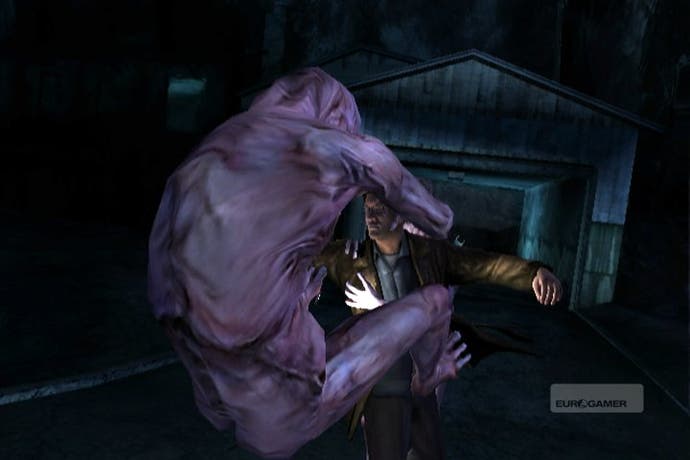Silent Hill: Shattered Memories
Don't go breaking my heart.
The central conceit of the game, and the reason for its subtitle, is that Harry is reliving the events that transpired in Silent Hill from the comfy leather sofa of a therapist. Every now and then, the game will drop you out of the world and back into the therapist's office, where you'll talk about what has happened, and perhaps play some simple psychological games. In fact, one of the first pieces of interaction in the game will be to fill out a short sheet full of very personal questions ("Have you ever cheated on a partner?" springs to mind).
The trick, the developers say, is that it's not actually the therapist sequences which the game uses to assess you. They're just there to make you aware that you're being watched and evaluated, and the answers you fill out don't have the kind of direct impact you'd expect. Instead, the game watches how you play - what you look at, how long you spend doing various things or exploring places, how you approach problems - and builds up a profile of you which it then uses to change the game, often in dramatic ways.
Even in the short demo which I played, this was an extremely important part of the game. How I played and responded to the game changed which routes were open to me, and which characters I could meet - it even changed whether those characters were hostile or friendly. The developers reckon that a hundred players going through Shattered Memories would each have a unique experience. Each one would have some shared experiences, of course, and many key plot points remain the same, but each one would also experience at least one part of the game that none of the others did.
This, I suspect, is why we're not hearing about the monsters - because Climax is working on taking them to their logical conclusion. Silent Hill's monsters have always been based on the psyche of the main character - Climax, it seems, may be aiming to base encounters with monsters on the player's psyche, working out what kind of player you are and subtly changing the beasts you'll encounter based on that. If that's the case, it makes the profiling system even more interesting. Either way, the idea of watching the player and manipulating the game based on their approach and personality is a fascinating new direction for survival horror - assuming, of course, that it works.

That's the caveat which dogs Silent Hill: Shattered Memories all the way. For all that I love it, Silent Hill is a franchise that's pretty much dead in the water at the moment. The original development team, Team Silent, no longer exists; when Climax wanted to talk to the original Silent Hill 1 developers about the game, they found that the team members have scattered around Konami or moved to other companies around the world. Only composer and producer Akira Yamaoka remains directly involved with the Silent Hill franchise. The franchise needs an update, and a team willing to take bold, radical moves without being bound by too much reverence for a game designed by a long-dissolved team.
Climax thinks that it's that team, and it's willing to risk the ire of Silent Hill fans by reinventing and rethinking many of the systems at the heart of the game. It's bold and brave, for sure, but as I departed sunny Portsmouth, I had no clearer an idea of whether Climax' new vision of Silent Hill would actually work or not. I'm reassured by their confidence and willingness to innovate, but worried by the enormity of the task they're taking on. The wait for Silent Hill's rebirth continues, excitement tempered by trepidation.
Silent Hill: Shattered Memories is due out for Wii, PS2 and PSP this autumn.












